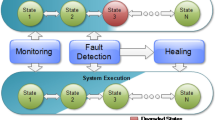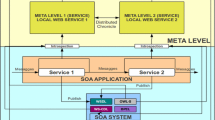Abstract
Mission Critical Systems (MCS) require continuous operation since a failure might cause economic or human losses. Autonomous Decentralized Service Oriented Architecture (ADSOA) is a proposal to design and develop MCS in which the system functionality is divided into service units in order to provide functional reliability and load balancing; on the other hand, it offers high availability through distributed replicas. A fault detection and recovering technology has been proposed for ADSOA based on collective intelligence. In this technology, an operation service level degradation should be detected autonomously by the service units at a point in which the continuity of the service may be compromised. Once a failure of this type is detected, each service unit analyses the system’s state and collectively decide the strategy to recover itself. The recovery technology instructs those selected service units to be gradually cloned in order to get the operational service level.
Access this chapter
Tax calculation will be finalised at checkout
Purchases are for personal use only
Similar content being viewed by others
References
Mori, K., Miyamoto, S., Ihara, H.: Proposition of autonomous decentralized concept. J. IEEE Japan 104(12), 303–310 (1994)
Ihara, H., Mori, K.: Autonomous decentralized computer control systems. IEEE Comput. 17(8), 57–66 (1984)
Mori, K.: Autonomous decentralized computer control systems. In: First International Symposium on Autonomous Decentralized Systems, ISADS 1993, Kawasaki, Japan, pp. 28–34 (1993)
Coronado-García, L.C., Pérez-Leguízamo, C.: A mission-critical certification authority architecture for high reliability and response time. IJCCBS Spec. Issue Auton. Decent. Syst. Web Comput. 2(1), 6–24 (2011)
Coronado-García, L.C., Hernández-Torres, P.J., Pérez-Leguízamo, C.: An autonomous decentralized system architecture using a software-based secure data field. In: The 10th International Symposium on Autonomous Decentralized Systems, ISADS 2011, Kobe, Japan (2011)
Coronado-García, L.C., Hernández-Torres, P.J., Pérez-Leguízamo, C.: An autonomous decentralized service oriented architecture for high reliable service provision. In: The 10th International Symposium on Autonomous Decentralized Systems, ISADS 2011, Kobe, Japan (2011)
Erl, T.: Service-Oriented Architecture (SOA): Concepts, Technology, and Design. Prentice Hall, Upper Saddle River (2005)
Josuttis, N.M.: SOA in Practice: The Art of Distributed System Design. O’Reilly Media, Newton (2007)
Xiaodong, H., Vokkarane, V.M., Jue, J.P.: Burst cloning: a proactive scheme to reduce data loss in optical burst switched networks. In: IEEE International Conference on Communications, ICC 2005, Seoul, Korea (2005)
Riadi, S., Mohammed, V.-A.: A decision algorithm for efficient hybrid burst retransmission and burst cloning scheme over star OBS networks. In: Second International Conference on Innovating Computing Technology, INTECH 2012, Casablanca, Morocco (2012)
Ji, L., Yeung, K.L.: Burst cloning with load balancing. In: Optical Fiber Communication Conference, OFC 2006, Anaheim, California (2006)
Askar, S., Zervas, G., Hunter, D.K., Simeonidou, D.: Classified cloning for QoS provisioning in OBS networks. In: The 36th European Conference and Exhibition on Optical Communication, ECOC 2010, Turin, Italy (2010)
Shehory, O., Sycara, K., Chalasani, P., Jha, S.: Agent cloning: an approach to agent mobility and resource allocation. IEEE Commun. 36(7), 63–67 (1998)
Ye, D., Zhang, M., Sutanto, D.: Cloning, resource exchange and relation adaptation: an integrative self-organisation mechanism in a distributed agent network. IEEE Trans. Parallel Distrib. Syst. PP(99), 1 (2013)
Laplant, P.A., Ovaska, S.J.: Real Time Systems Design and Analysis. Wiley-IEEE Press, Hoboken (2011)
Author information
Authors and Affiliations
Corresponding author
Editor information
Editors and Affiliations
Rights and permissions
Copyright information
© 2019 Springer Nature Switzerland AG
About this paper
Cite this paper
Godínez Borja, J.S.G., Corona Ruiz, M.A., Pérez Leguízamo, C. (2019). ADSOA - Fault Detection and Recovery Technology Based on Collective Intelligence. In: Martínez-Villaseñor, L., Batyrshin, I., Marín-Hernández, A. (eds) Advances in Soft Computing. MICAI 2019. Lecture Notes in Computer Science(), vol 11835. Springer, Cham. https://doi.org/10.1007/978-3-030-33749-0_15
Download citation
DOI: https://doi.org/10.1007/978-3-030-33749-0_15
Published:
Publisher Name: Springer, Cham
Print ISBN: 978-3-030-33748-3
Online ISBN: 978-3-030-33749-0
eBook Packages: Computer ScienceComputer Science (R0)




